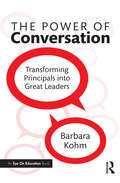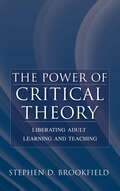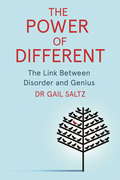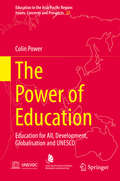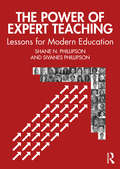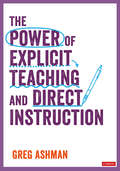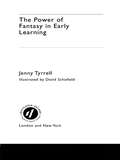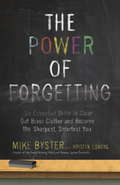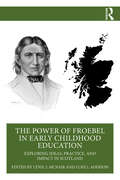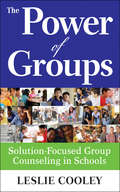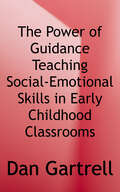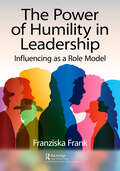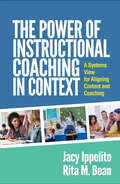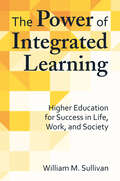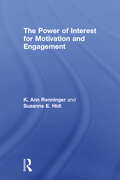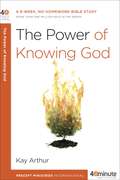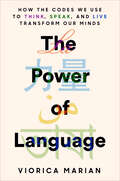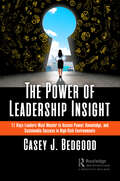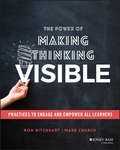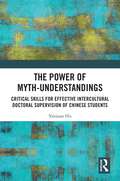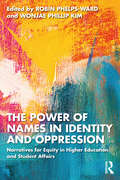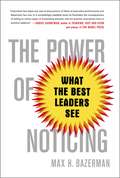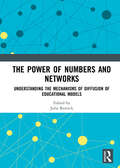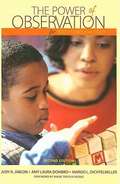- Table View
- List View
The Power of Conversation: Transforming Principals into Great Leaders
by Barbara KohmPowerful conversations facilitate powerful thinking. In The Power of Conversation, seasoned educator Barbara Kohm provides principals and mentors with a roadmap for growing into great leaders and transforming ordinary schools into great ones. Designed to harness the power of focused professional conversation, this book uses dialogues between a principal and a mentor or colleague to explore everyday school dilemmas, such as scheduling, discipline, budgeting, and instructional challenges. Each chapter explores transformational themes, provides strategies and guidelines for leaders to apply in their own schools, and includes reflective exercises. This book engages an accessible and thoughtful way for principals to talk about complicated issues, deepen thinking, develop skills, and fuel transformational leadership.
The Power of Critical Theory: Liberating Adult Learning and Teaching
by Stephen D. BrookfieldThe Power of Critical Theory is Brookfield’s attempt to put the “critical” back into critical thinking by emphasizing that it is an inherently political process. The book presents powerful arguments for the importance of critical theory in fostering the kind of learning that leads to a truly democratic society, and it explores a number of tasks for adult learners including learning to challenge ideology, contest hegemony, unmask power, overcome alienation, learn liberation, reclaim reason, and practice democracy.
The Power of Different: The Link Between Disorder and Genius
by Dr. Gail SaltzThe Power of Different is an illuminating and uplifting examination of the link between brain differences and aptitude. Psychologist and bestselling author Gail Saltz presents the latest scientific research and profiles famous geniuses and lay individuals who have been diagnosed with all manner of brain 'problems' - including learning disabilities, ADD, anxiety, depression, bipolar disorder, schizophrenia and autism. Saltz shows that the source of our struggles can be the origin of our greatest strengths. Rooted in her experience as a professor and practicing psychiatrist, and based on the latest neurological research, Saltz demonstrates how specific deficits in certain areas of the brain are directly associated with the potential for great talent. She also shows how the very conditions that can cause difficulty at school, in social situations, at home or at work, are bound to creative, disciplinary, artistic, empathetic and cognitive abilities.In this pioneering work, readers will find engaging scientific research and stories from historical geniuses and everyday individuals who have not only made the most of their conditions, but who have flourished because of them. Enlightening and inspiring, The Power of Different shows how the unique wiring of every brain can be a source of strength and productivity, and can contribute to the richness of our world.
The Power of Education
by Colin PowerThis book is about the power of education: the kind of education that simultaneously improves the quality of life both of individuals and the wider society. It explains why education must be viewed as a basic human right, as a value in and of itself, and reviews the evidence on how education builds the human resources that individuals and nations need to be productive, to continue to learn, to solve problems, to be creative, and to live together and with nature in peace and harmony. When nations ensure that such an education is accessible to all throughout their lives, education becomes the engine of sustainable development - economic, social, moral and cultural. The book is unique in that it covers the development of education at all levels in all countries of the Asia-Pacific region and beyond, using the latest international data bases, while blending in analyses of both quantitate and qualitative research.
The Power of Expert Teaching: Lessons for Modern Education
by Shane N. Phillipson Sivanes PhillipsonThroughout the world, the challenges facing modern education are formidable. Although some of the challenges facing are unique to each educational jurisdiction, there are also some important commonalities that transcend jurisdictions. Irrespective of the nature of these challenges, there is an increasing focus on teacher quality – what it is and how to enhance it. To date, research tells us what expert teachers should be doing in their classrooms. This approach is based on the idea that teaching expertise is nothing more than the accumulation of specific skills and knowledge, and as teachers acquire these skills and knowledge most of our educational challenges can be overcome. This book questions this idea by asking 37 teachers who are already recognised as experts to share their classroom secrets. Importantly, the teachers come from diverse cultural contexts, including Australia, Finland, Hong Kong and the US, and they share: how they became expert teachers; their expectations for every student when they enter their classroom; how they view and encourage teacher–parent partnerships; and what skills and knowledge they consider important for expert teaching. To our knowledge, this is the first book that compares and contrasts the approaches taken by expert teachers from four very different cultural groups. The book helps to demystify the work of the modern teacher – what they do and the challenges they face. If you aspire to be an expert teacher, this book provides a clear model of how to approach the process. If you are an education researcher searching for ‘impact’, this book outlines what are some of the emerging hot topics in education research. If you are involved in teacher education then this book offers some new approaches to initial teacher education. If your focus is on educational policy, this book helps make sense of the links between the classrooms of expert teachers, education research and academic achievement. Finally, this book will help parents understand how best to partner with their child’s teacher in order to enhance their learning.
The Power of Explicit Teaching and Direct Instruction (Corwin Ltd)
by Greg AshmanDirect instruction and explicit teaching can offer you a shorter, straighter route to developing effective learning in your classroom. In this smart and accessible book, Greg Ashman explores how you can harness the potential of these often misunderstood and misapplied teaching methods to achieve positive learning outcomes for the students you teach. It investigates key foundational principles, combined with thoughtful commentary on what these mean in classroom practice and an examination of relevant research and theories from cognitive psychology that substantiate these approaches to teaching and learning.
The Power of Explicit Teaching and Direct Instruction (Corwin Ltd)
by Greg AshmanDirect instruction and explicit teaching can offer you a shorter, straighter route to developing effective learning in your classroom. In this smart and accessible book, Greg Ashman explores how you can harness the potential of these often misunderstood and misapplied teaching methods to achieve positive learning outcomes for the students you teach. It investigates key foundational principles, combined with thoughtful commentary on what these mean in classroom practice and an examination of relevant research and theories from cognitive psychology that substantiate these approaches to teaching and learning.
The Power of Fantasy in Early Learning
by Jenny TyrrellThe Power of Fantasy in Early Learning is a truly unique book, based around the case study of a class of children, their teacher and a stuffed bear suit. Jenny Tyrrell illustrates the possibilities that an inanimate object can offer the teaching and learning situation. Drawing on her extensive experiences, she shows how the bear became an integral part of the school. Theory and practice are combined to explore teaching issues in the early years including the influence of the bear on the whole school, imaginative development, motivation to read and write and the influence of learning goals in a child's school life in the early years.This is a truly original work which will give heart to teachers everywhere and provide plenty of fresh insight into the debate on the nature of learning.
The Power of Forgetting
by Mike BysterAn uncommon guide for accomplishing more every day by engaging the unique skill of forgetting, from the creator of the award-winning memory training system BraineticsIs it possible that the answer to becoming a more efficient and effective thinker is learning how to forget? Yes! Mike Byster will show you how mastering this extraordinary technique--forgetting unnecessary information, sifting through brain clutter, and focusing on only important nuggets of data--will change the quality of your work and life balance forever.Using the six tools in The Power of Forgetting, you'll learn how to be a more agile thinker and productive individual. You will overcome the staggering volume of daily distractions that lead to to brain fog, an inability to concentrate, lack of creativity, stress, anxiety, nervousness, angst, worry, dread, and even depression. By training your brain with Byster's exclusive quizzes and games, you'll develop the critical skills to become more successful in all that you do, each and every day.d elsewhere, Genius is a bold call for all of us to ignite our inner genius--and live up to our greatest potential.
The Power of Froebel in Early Childhood Education: Exploring Ideas, Practice, and Impact in Scotland
by Lynn. J. McNair Luke J. AddisonAcross the globe there has been a significant resurgence of interest in Froebel's philosophy in practice and Scotland is a front-runner in its systemic adoption of a Froebelian approach. This book offers a never-before-seen glimpse into Scotland’s world-leading community of Froebel-inspired early childhood practice.Liberated by national guidance, the expert contributors unearth the recent history of this movement to embed child, community, and ecologically centred education from birth to five and beyond in local, regional and national contexts. It offers valuable insight into the transformational work taking place in individual nursery and kindergarten settings, as well as policy circles and the emergent professional networks and research supporting both. It also highlights the challenges faced in moving away from the developmental and neo-liberal approaches that have governed early childhood education for over three decades, amid real economic and social pressures which continue to pressure early learning environments to produce “school-ready” children.Written primarily from the perspective of practitioners, it makes a compelling case that change is driven from the bottom up, and offers insightful case studies to show how this pedagogy has children, families and communities at its heart. The Power of Froebel in Early Childhood Education is a vital companion text for anyone considering the implementation of children’s rights in early education today.
The Power of Groups: Solution-Focused Group Counseling in Schools
by Leslie A. CooleyResearch-based and practical, this guide gives school professionals the theory and knowledge to adapt solution-focused brief counseling for student groups on any topic, curriculum, or grade level.
The Power of Guidance: Teaching Social-emotional Skills in Early Childhood Classrooms
by Dan GartrellChildcare providers and teachers in preschool and primary grade settings will greatly value the collection of writings in The Power of Guidance: Teaching Social-Emotional Skills In the Early Childhood Classroom. The writings provide a concise yet multi-faceted overview of the guidance approach used with this age group. The book examines the differences between patience and understanding and between misbehavior and mistaken behavior, important distinctions that must be made in order to understand and deal with various behaviors using the guidance approach. Readers also will learn the components of an encouraging classroom and strategies for maintaining it, leading to non-punitive approaches for classroom management. One chapter puts particular focus on intervention strategies with boys, a topic readers often seek out. The book has the distinction of being selected as a comprehensive member benefit for the NAEYC for 2003.
The Power of Humility in Leadership: Influencing as a Role Model
by Franziska FrankTo many people, the words ‘leader’ and ‘humble’ are not natural bedfellows. Yet once they have grasped the definition most employees desire a humble leader, while a majority of managers believe they already are one. What appears deceptively simple is trickier than expected. Narcissism, lack of perception, fixed mindsets, and neuronal default settings are only a few of the stumbling blocks on the path to humility. What exactly is this sought-after humility? Humility consists of four key elements: 1) Seeing one’s own strength and weaknesses and revealing them where needed for the bigger picture; 2) Appreciating others for what they are, do now and can do; 3) Being open and willing to learn; 4) Understanding that we are all only a small part of a larger picture, easily replaceable and favored by luck and circumstance. Therefore, humility has nothing to do with being weak or hiding the light under the bushel. Instead, it is about clarity, taking a step back from one’s ego and thus being able to serve the greater picture. The author’s own research with more than 2,000 managers contributes to the canon of positive effects of humility that have been measured by dozens of researchers during the last decade. Humility benefits employees (ranging from better performance, more innovation, stronger resilience to better client relations, and stronger morals), the organization (ranging from better ambidextrous strategies, a better culture to fewer sunk costs) and the managers themselves (ranging from more seen leadership potential to less stress and better relationships with employees). Dozens of case studies, quotes from more than 150 interviews with top managers, lively storytelling of real-life examples, and solid research with actionable take-aways, plus personal assessments, make this an eminently readable and practical book for managers worldwide.
The Power of Instructional Coaching in Context: A Systems View for Aligning Content and Coaching
by Rita M. Bean Jacy IppolitoFrom nationally known experts, this book provides guidance for leveraging the power of instructional coaching and helping coaching programs succeed. It addresses the crucial importance of developing practices that align instructional goals (content) with school, district, and community factors that influence the work of K–12 teachers and coaches (context). The authors present a framework and practical tools for embedding coaching into the fabric of school life, in service of creating equitable opportunities and outcomes for all students. Instructive features throughout the chapters include Framing Questions, Voices from the Field vignettes, Stop and Reflect opportunities, and Reflection Activities and Questions. Reproducible planning forms can be copied from the book or downloaded and printed in a convenient 8 1/2" x 11" size.
The Power of Integrated Learning: Higher Education for Success in Life, Work, and Society
by William M. SullivanStudents and their parents wonder if college is worth the investment. Employers want graduates with the skills they need. The public wonders if higher education is preparing future generations for an era of dynamic change. In his latest book, William Sullivan offers a model of higher education that answers all these questions in the affirmative, through the power of integrated learning. Drawing on examples from the 25 members of the New American Colleges & Universities (NAC&U) consortium, the book makes the case for an approach that combines the strengths of the liberal arts, professional studies, and civic responsibility in order to give students the combination of skills and experience that will prepare them for success in all aspects of life after graduation.NAC&U campuses place emphasis upon enabling their students to know themselves and their abilities, as well as providing them with opportunities to develop a sophisticated understanding of the world. To achieve these goals, the academic programs focus on developing students’ intellectual and practical skills, such as analytical ability, problem solving, facility in written and spoken communication, and an appreciation for human diversity and creativity. These have traditionally been identified as the goals of a liberal arts education, and are the same ones identified in a national employer survey as giving job-seekers an edge.These institutions also invest a great deal of effort to provide their students with state-of-the-art preparation for professional life and occupational success in diverse fields. These range from the technical – science and technology fields, with disciplines such as engineering and computer science – through business, and across the human service fields, such as education, nursing, pre-medicine, and pre-law, to architecture, and the performing and visual arts. In these courses of study, students begin to shape their future careers.The important third value of a NAC&U education is fostering civic responsibility among students. In programs of study abroad and a range of internship and service opportunities, these colleges support their students in shaping for themselves unique and effective ways to contribute to the larger life of their world.Parents and prospective students may appreciate the chance to learn more about these schools and what they have to offer, while those working in higher education will appreciate the chance to learn more about a model that their own institutions may be motivated to emulate. All readers will take away a picture of a truly vital part of the higher education landscape in this country.
The Power of Interest for Motivation and Engagement
by K Ann Renninger Suzanne HidiThe Power of Interest for Motivation and Engagement describes the benefits of interest for people of all ages. Using case material as illustrations, the volume explains that interest can be supported to develop, and that the development of a person's interest is always motivating and results in meaningful engagement. This volume is written for people who would like to know more about the power of their interests and how they could develop them: students who want to be engaged, educators and parents wondering about how to facilitate motivation, business people focusing on ways in which they could engage their employees and associates, policy-makers whose recognition of the power of interest may lead to changes resulting in a new focus supporting interest development for schools, out of school activity, industry, and business, and researchers studying learning and motivation. It draws on research in cognitive, developmental, educational, and social psychology, as well as in the learning sciences, and neuroscience to demonstrate that there is power for everyone in leveraging interest for motivation and engagement.
The Power of Knowing God: A 6-Week, No-Homework Bible Study (40-Minute Bible Studies)
by Kay ArthurDo you really know God? You may know about God, but do you truly know what He says about Himself--and what He wants from you? This eye-opening study will help you gain a true understanding of God's character and His ways. As you discover for yourself who He is, you'll be drawn into a deeper, more personal relationship with the God of the universe--a relationship that will enable you to confidently display His strength in life's most challenging circumstances.40 minutes a week could change your life! The 40-Minute Bible Studies series from the teaching team at Precepts Ministries International tackles the topics that matter to you. These inductive study guides, designed to be completed in just six 40-minutes lessons with no homework required, help you discover for yourself what God says and how it applies to your life today. With the leader's note and Bible passages included right in the book, each self-contained study is a powerful resource for personal growth and small-group discussion.
The Power of Language: How the Codes We Use to Think, Speak, and Live Transform Our Minds
by Viorica Marian&“Sparkles with insight.&”—Daniel PinkThis revolutionary book goes beyond any recent book on language to dissect how language operates in our minds and how to harness its virtually limitless power. As Dr. Marian explains, while you may well think you speak only one language, in fact your mind accommodates multiple codes of communication. Some people speak Spanish, some Mandarin. Some speak poetry, some are fluent in math. The human brain is built to use multiple languages, and using more languages opens doors to creativity, brain health, and cognitive control. Every new language we speak shapes how we extract and interpret information. It alters what we remember, how we perceive ourselves and the world around us, how we feel, the insights we have, the decisions we make, and the actions we take. Language is an invaluable tool for organizing, processing, and structuring information, and thereby unleashing radical advancement. Learning a new language has broad lifetime consequences, and Dr. Marian reviews research showing that it: · Enhances executive function—our ability to focus on the things that matter and ignore the things that don&’t. · Results in higher scores on creative-thinking tasks. · Develops critical reasoning skills. · Delays Alzheimer&’s and other types of dementia by four to six years. · Improves decisions made under emotional duress. · Changes what we see, pay attention to, and recall.
The Power of Leadership Insight: 11 Keys Leaders Must Master to Access Power, Knowledge, and Sustainable Success in High-Risk Environments
by Casey J. BedgoodLeadership is a risky business. In the current world, change is the new normal and only constant. As change grows, so does risk. Thus, leaders must be master change agents and master mitigators of risk. But, how will leaders succeed if they don’t measure and lack insight? Simply put, they won’t. Those that are successful in these arenas will ride the waves of success during their tenure on the leadership stage. In contrast, their counterparts will be crushed by the never-ending waves of disruption. Often leaders or those aspiring erroneously view leadership power from a self-interested perspective. They see power through the lens of a title, position, control over others, influence, emotional intelligence and the like. Unfortunately, this view is misaligned and short sighted. Another perspective of leadership is the ability to impact positive change for those around you. In reality, leaders are those that use their gifts, skills and knowledge to educate and empower others in the long run. The purpose of this book is to unveil insight as to the true meaning of leadership power – how to attain it, how to leverage it to add the greatest amount of value to humanity, how to weaponize it to marginalize and eliminate risk and how to share it with others so they can carry the torch once you step off the leadership stage. In this book, readers will learn: How to master the art of change The value of leadership self-advocacy The pearls and pitfalls of leading integration teams The unintended consequences of sharing knowledge The sidewinder effect of misinterpreting root causes of success The leadership test of humility Leadership matchmaking to ensure the right leaders are selected to solve the organization’s problems Leadership Loopholes: The Houdini Effect The risk of underestimating leadership value The risk of not focusing on the right attributes The risk of leading turnarounds
The Power of Making Thinking Visible: Practices to Engage and Empower All Learners
by Ron Ritchhart Mark ChurchThe long-awaited follow-up to Making Thinking Visible, provides new thinking routines, original research, and unique global case studies Visible Thinking—a research-based approach developed at Harvard’s Project Zero – prompts and promotes students’ thinking. This approach has been shown to positively impact student engagement, learning, and development as thinkers. Visible Thinking involves using thinking routines, documentation, and effective questioning and listening techniques to enhance learning and collaboration in any learning environment. The Power of Making Thinking Visible explains how educators can effectively use thinking routines and other tools to engage and empower students as learners and transform classrooms into places of deep learning. Building on the success of the bestselling Making Thinking Visible, this highly-anticipated new book expands the work of the original by providing 18 new thinking routines based on new research and work with teachers and students around the world. Original content explains how to use thinking routines to maximum effect in the classroom, engage students exploration of big ideas, link thinking routines to formative assessment, and more. Providing new research, new global case studies, and new practices, this book: Focuses on the power that thinking routines can bring to learning Provides practical insights on using thinking routines to facilitate student engagement Highlights the most effective techniques for using thinking routines in the classroom Identifies the skillsets and mindsets needed to truly make thinking visible Features actionable classroom strategies that can be applied across grade levels and content areas Written by researchers from Harvard’s Project Zero, The Power of Making Thinking Visible: Using Routines to Engage and Empower Learners is an indispensable resource for K-12 educators and curriculum designers, higher education instructional designers and educators, and professional learning course developers.
The Power of Myth-understandings: Critical Skills for Effective Intercultural Doctoral Supervision of Chinese Students
by Yanjuan HuThe book addresses the misunderstandings and implicit stereotypes that continue to arise in and influence the intercultural encounters of staff and international doctoral students.In addition to providing real-life examples, the author demonstrates that misunderstandings recur due to a lack of implicit and complex intercultural knowledge and practical tools for applying this knowledge in daily practice. She proposes the concept of "myth-understanding" to describe a temporary and transitional state of clarity deficiency before misunderstandings arise, which helps to create a "buffer zone" to address potential misunderstandings between international students and their supervisors. Instead of focusing on the negative aspects of misunderstandings, the book sheds light on the positive side—it indicates that intercultural differences can provide an opportunity for both supervisors and students to develop implicit intercultural knowledge, challenge their preconceptions of each other, and reassess their own educational perspectives and practices.The book will attract scholars of intercultural education, European university staff and professors who interact with international students, intercultural education officers, and doctoral students with an international (especially Asian) background.
The Power of Names in Identity and Oppression: Narratives for Equity in Higher Education and Student Affairs
by Robin Phelps-Ward Wonjae Phillip KimStories and personal narratives are powerful tools for engaging in self-reflection and application of critical theory in higher educational contexts. This edited text centers "name stories" as a vehicle to promote readers’ understanding of social identity, oppression, and intersectionality in a variety of educational contexts from residence halls and classrooms to faculty development workshops and executive leadership board rooms. The contributors in this volume reveal how names may serve as entry points through which to foster learning and facilitate conversations about identity, power, privilege, and systems of oppression. Through an intersectional perspective, chapter authors reveal interlocking systems of oppression in education while also providing recommendations, lessons learned, reflection questions, and calls to action for those working to transform and advance equity-minded campus climates. This unique volume is for educators at colleges and universities doing equity work, seeking ways to initiate, facilitate, and maintain rich conversations about identity.
The Power of Noticing
by Max BazermanFrom Harvard Business School Professor and Co-Director of the Harvard Kennedy School's Center for Public Leadership: A guide to making better decisions, noticing important information in the world around you, and improving leadership skills.Imagine your advantage in negotiations, decision-making, and leadership if you could teach yourself to see, and evaluate, information that others overlook. The Power of Noticing provides the blueprint for accomplishing precisely that. Max Bazerman, an expert in the field of applied behavioral psychology, draws on three decades of research and his experience instructing Harvard Business School MBAs and corporate executives to teach you how to notice and act on information that may not be immediately obvious. Drawing on a wealth of real-world examples, from the Challenger Space Shuttle disaster to Bernie Madoff's Ponzi scheme, Bazerman diagnoses what information went ignored in these situations, and why. Using many of the same case studies and thought experiments designed in his executive MBA classes, he challenges readers to explore their cognitive blind spots, identify any salient details they are programmed to miss, and then take steps to ensure it won't happen again. While many bestselling business books have explained how susceptible to manipulation our irrational cognitive blindspots make us, Bazerman helps you avoid the habits that lead to poor decisions and ineffective leadership in the first place. His book provides a step-by-step guide to breaking bad habits and spotting the hidden details that will change your decision-making and leadership skills for the better, teaching you to: pay attention to what didn't happen; acknowledge self-interest; invent the third choice; and realize that what you see is not all there is. With The Power of Noticing at your side, you can learn how to notice what others miss, make better decisions, and lead more successfully.
The Power of Numbers and Networks: Understanding the Mechanisms of Diffusion of Educational Models
by Julia ResnikThis book is an important contribution to the understanding of the complex education policies of the twenty-first century. It unites world renowned comparatists of education in an effort to respond to the challenges raised by the multidimensional and multi-scalar aspects of education policies. In their attempt to decipher the tangled world of education policies, the authors underline the power of numbers, the power of networks and the power of new concepts and methodologies. The power of numbers – education through numbers via students’ assessments and national or international testing impacts upon our educational choices and reinforces its instrumental aspects. The power of networks – sheds light on the complexity of the education global governance network by focusing on how international governmental organisations (IGOs), such as UNESCO, the OECD and the World Bank carry out policy and on the intricate ways an educational concern becomes part of the international agenda. The power of concepts and methods – policymaking is increasingly dynamic and involves many different stakeholders, including states, private corporations, IGOs, scholars and non-profit organisations. Contributors to this volume have developed new conceptual and methodological perspectives to study the circulation of educational models worldwide. A relational notion of space, the concept of ‘diaspora’ as a space of relations of social actors or the global comparative approach and a methodology drawn on actors-network theory are among the propositions yielded by the authors in order to make sense of and grasp the complexity of education policies today. This book was originally published as a special issue of Globalisation, Societies and Education.
The Power of Observation Second Edition
by Amy Laura Dombro Judy R. Jablon Margo L DichtelmillerThe Power of Observation explores the vital connection between observation and effective teaching. In this book, the authors share their own and others' experiences to illustrate how observation helps teachers and caregivers become more effective in the child care center, preschool, family child care home, and elementary classroom.
